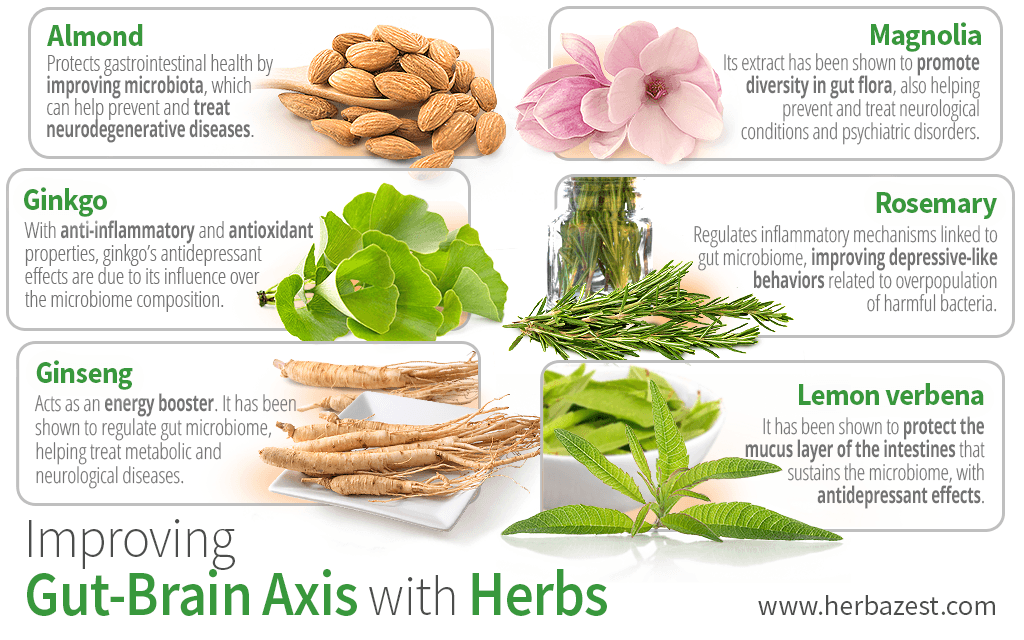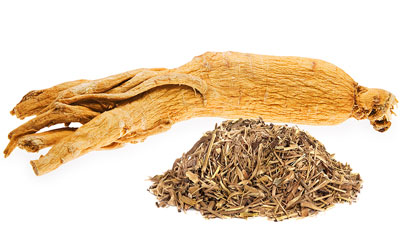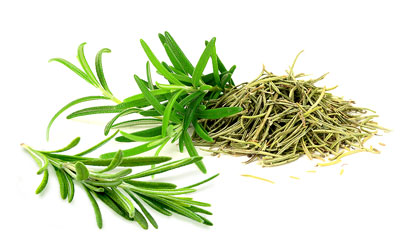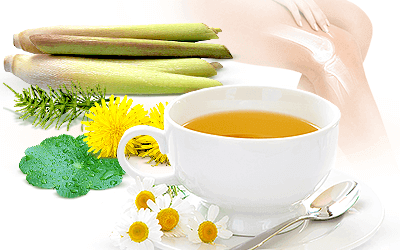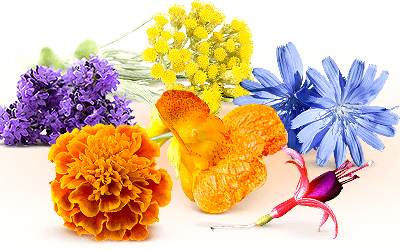The brain-gut axis has been a subject of particular interest of scientists and the general public in recent years. There are a great number of studies seeking to reveal the mechanisms connecting the microbiome composition in the gut to changes in brain functioning. What's known, so far, is that the balance or imbalance of intestinal flora can influence mood, energy, and general neurological function. It has been found that many health conditions currently on the rise, such as Alzheimer's disease, depression, and irritable bowel syndrome (IBS), have a microbiome imbalance in common. Their symptoms tend to improve when the gut health issue is addressed.
In search of solutions for better mental and gastrointestinal health, researchers have identified several medicinal plants that may be potentially helpful in restoring the brain-gut axis balance. Keep reading to discover the best herbs for gut health that also help with brain function, and start a journey to holistic well-being.
1. Almonds
Tree nuts are well-known as an essential “brain-food”. However, almonds are also rich in fiber and minerals as well as phenolic compounds that protect gastrointestinal health. In fact, it has been shown that almonds improve fecal microbiota in adults with high blood sugar. They have also been proven effective in promoting the growth of short-chain fatty acid-producing bacteria. Short-chain fatty acids (SCFAs) play a key role in gut-brain interactions, and their deficiency has been linked to many neurodegenerative diseases, including Alzheimer's disease.1,2 Almonds are delicious and pretty easy to add to any diet, either as healthy snacks or as an ingredient in sweet recipes, such as gluten-free red quinoa madeleines, a creamy quinoa almond & oatmeal smoothie, and many more.
2. Ginkgo
The effectiveness of ginkgo for treating and preventing neurodegenerative and age-related diseases is attributed to its powerful anti-inflammatory and antioxidant properties.3 Additionally, going one step further in the brain-gut axis theory, it has been recently revealed that a polysaccharide in ginkgo biloba's leaves can exert antidepressant effects by influencing the microbiome composition in a way that resembles the effects of paroxetine, a common medication prescribed for depression.4 Ginkgo is generally consumed as a supplement, and many herbal remedies, like these ginseng ginkgo cacao pills to improve concentration, can be made at home using its powdered leaves.
3. Ginseng
Used by milennia in traditional Chinese medicine (TCM), ginseng is a treasure of health benefits. The polysaccharides in ginseng are not only used by the body as an energy booster, but its gingenosides have been shown to regulate gut microbiome, helping treat metabolic and neurological diseases. Ginseng can increase the population of probiotics, including Bifidobacterium, and help decrease that of harmful bacteria, such as Helicobacter.5 Moreover, a study has suggested that korean red ginseng could aid against residual symptoms of depression. In fact, gingenosides have beneficial effects on hormones that help reduce stress, and they have been shown to support neurotransmission and neuronal growth, protecting the central nervous system and improving memory.6
4. Magnolia
The magnolia tree is much more than a popular ornamental with fragrant flowers. Hailing from Asia, magnolia has been highly valued in traditional Chinese medicine for its many benefits, which include neuroprotective and digestive properties. The extract of magnolia bark has been shown to promote diversity in gut flora damaged by antibiotics.7 Additionally, research on the main compounds of magnolia, neolignans, has suggested that they can protect the nerve cells and endothelial cells in the brain, thus helping prevent and treat neurological conditions and psychiatric disorders.8
5. Rosemary
Widely used in aromatherapy and in the kitchen, the relaxing and anxiolytic effects of rosemary have been corroborated by scientific studies. However, until recently, little was known about the effects of rosemary's active compounds on the human microbiome and brain function. Turns out that rosmarinic acid, the most important polyphenol in rosemary's leaves, has a key influence over the inflammatory mechanisms related to gut microbiome. It helps improve depressive-like behaviors linked to dysbiosis in the macrobiome by reducing the population of harmful bacteria and reducing inflammation in the hippocampus.9 Additionally, rosemary's diterpenes have shown great potential for the treatment of Alzheimer's disease.10 Maintain a healthy brain-gut axis with a rosemary tonic tincture for brain function or a simple rosemary tea for memory improvement.
6. Lemon Verbena
Lemon verbena is rich in ursolic acid, which promotes intestinal health. It seems to work by regulating the expression of genes related to immune response, anti-inflammatory cytokines, and antioxidative stress enzymes. Lemon verbena extracts have shown to protect the mucus layer of the intestines that sustains the microbiome.11 Furthermore, lemon verbena has shown to have antidepressant effects comparable to those of fluoxetine; however, further research is necessary to corroborate these findings.12
Adding these herbs for gut and brain balance to your daily routine, either as supplements or herbal remedies, along with healthy meals, free of artificial additives and saturated fats, can help improve your microbiome and brain function, increasing your energy levels and providing a greater sense of well-being.
Sources
- Advances in Nutrition, Diet and the Microbiota–Gut–Brain Axis: Sowing the Seeds of Good Mental Health, 2021
- Aging and Disease, Mechanisms of Short-Chain Fatty Acids Derived from Gut Microbiota in Alzheimer's Disease, 2022
- Frontiers in Medicine, Guts Imbalance Imbalances the Brain: A Review of Gut Microbiota Association With Neurological and Psychiatric Disorders, 2022
- Frontiers in Pharmacology, Traditional Chinese Medicine and Gut Microbiome: Their Respective and Concert Effects on Healthcare., 2020
- Journal of Evidence-Based Integrative Medicine, Dysfunction of the Microbiota-Gut-Brain Axis in Neurodegenerative Disease: The Promise of Therapeutic Modulation With Prebiotics, Medicinal Herbs, Probiotics, and Synbiotics, 2020
- Molecules, Treatment of Gastrointestinal Disorders—Plants and Potential Mechanisms of Action of Their Constituents, 2022
- Nutrients, Medicinal Plants and Their Impact on the Gut Microbiome in Mental Health: A Systematic Review, 2022 | Associations between Frequency of Culinary Herb Use and Gut Microbiota, 2022
Footnotes
- Nutrients. 2021. The Effects of Almonds on Gut Microbiota, Glycometabolism, and Inflammatory Markers in Patients with Type 2 Diabetes: A Systematic Review and Meta-Analysis of Randomised Controlled Trials. Retrieved February 4, 2023, from: https://www.ncbi.nlm.nih.gov/pmc/articles/PMC8539485/
- Complementary Therapies in Clinical Practice. (2019). Effect of sweet almond syrup versus methylphenidate in children with ADHD: A randomized, triple-blind clinical trial. Retrieved February 4, 2023, from: https://www.sciencedirect.com/science/article/abs/pii/S1744388118303736
- Food & Function. (2019). One water-soluble polysaccharide from Ginkgo biloba leaves with antidepressant activities via modulation of the gut microbiome. Retrieved February 4, 2023, from: https://pubmed.ncbi.nlm.nih.gov/31742291/
- The Lancet Neurology. (2012). Long-term use of standardised ginkgo biloba extract for the prevention of Alzheimer's disease (GuidAge): a randomised placebo-controlled trial. Retrieved February 4, 2023, from: https://pubmed.ncbi.nlm.nih.gov/31742291/
- Frontiers in Cellular and Infection Microbiology. (2022). Gut Microbiota: Therapeutic Targets of Ginseng Against Multiple Disorders and Ginsenoside Transformation. Retrieved February 4, 2023, from: https://www.ncbi.nlm.nih.gov/pmc/articles/PMC9084182/
- Journal of Ginseng Research. (2017). Effects of ginseng on stress-related depression, anxiety, and the hypothalamic-pituitary-adrenal axis. Retrieved February 4, 2023, from: https://www.ncbi.nlm.nih.gov/pmc/articles/PMC5628357/
- Life Sciences. (2019). An orally administered magnoloside A ameliorates functional dyspepsia by modulating brain-gut peptides and gut microbiota. Retrieved February 4, 2023, from: https://pubmed.ncbi.nlm.nih.gov/31412264/
- Current Microbiology. (2020). The Therapeutic Effects of Magnolia Officinalis Extraction on an Antibiotics-Induced Intestinal Dysbacteriosis in Mice. Retrieved February 4, 2023, from: https://pubmed.ncbi.nlm.nih.gov/32561976/
- Frontiers in Pharmacology. (2018). Antidepressant Effects of Rosemary Extracts Associate With Anti-inflammatory Effect and Rebalance of Gut Microbiota. Retrieved February 4, 2023, from: https://www.ncbi.nlm.nih.gov/pmc/articles/PMC6192164/
- Evidence-Based and Complementary Alternative Medicine. 2016. The Therapeutic Potential of Rosemary (Rosmarinus officinalis) Diterpenes for Alzheimer's Disease. Retrieved February 4, 2023, from: https://www.ncbi.nlm.nih.gov/pmc/articles/PMC4749867/
- Frontier in Immunology. 2021. Medicinal Plant Leaf Extract From Sage and Lemon Verbena Promotes Intestinal Immunity and Barrier Function in Gilthead Seabream (Sparus aurata). Retrieved February 4, 2023, from: https://www.ncbi.nlm.nih.gov/pmc/articles/PMC8160519/
- Basic and Clinical Neuroscience. 2020. Evaluating the Antidepressant Effect of Verbena officinalis L. (Vervain) Aqueous Extract in Adult Rats. Retrieved February 4, 2023, from: https://www.ncbi.nlm.nih.gov/pmc/articles/PMC7253814/


